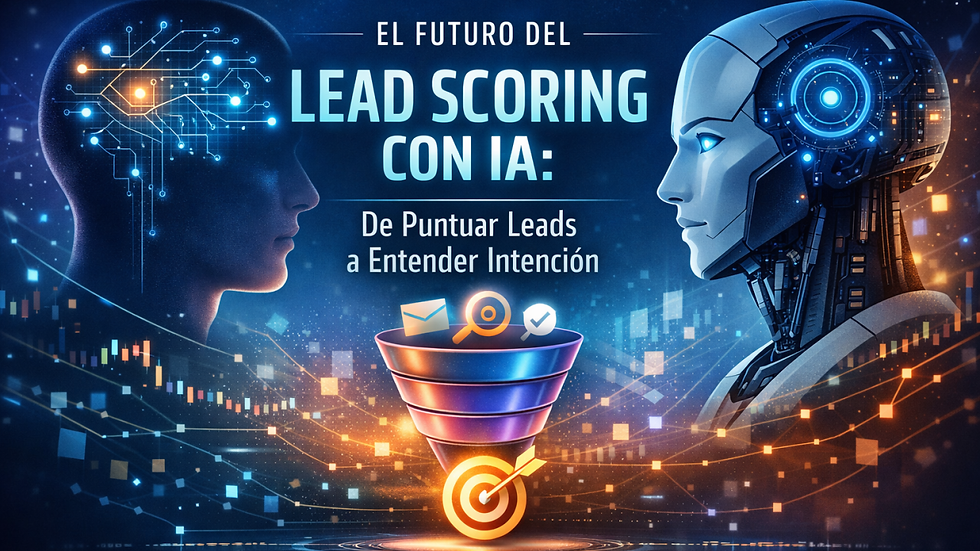How to calculate the value of a lead?
- Agustin Bignu

- Nov 4, 2024
- 4 min read
In digital marketing and sales, there is a lot of talk about ‘leads’ or prospects and their importance in the customer acquisition process. However, not all leads are the same, and knowing their real value is key to making better decisions and optimising efforts.
In this article, we will explore what a lead really means, how we can assess its value and the role of artificial intelligence in this process.
What is a lead?
A lead is a person or company that has shown interest in our product or service, and could potentially become a customer. Although this sounds simple, leads can take many forms: some are barely aware of our product, while others may be ready to buy. These differences in level of interest or readiness influence their value.
A customer with prior knowledge about our product or service, i.e. ‘educated’, will come with a much clearer intention than one who comes to ‘browse’. At this point it is necessary to know how to distinguish between the quality of these leads in order to be able to ‘separate the wheat from the chaff’. That is to say, we need a mechanism or a methodology that helps us to prioritise those with a greater intention to buy. We need Lead Scoring.

What is Lead Scoring?
Lead Scoring is a strategy for assigning a ‘score’ to leads based on their quality and purchase intent. This system allows sales teams to prioritise those leads that are closest to becoming customers, optimising efforts and resources.
It is a system that brings a lot of value to sales funnels, especially those with a high volume of leads. There are many different mechanisms for implementing these systems. For more information on which option is better or what best practices you should carry out, I recommend reading the following posts on our blog:
The systems we use to implement lead scoring are relevant, but not as relevant as the data we use to obtain these scores. This begs the question: how do we know what makes one lead more ‘valuable’ than another?
Ways to qualify the value of a lead
There are several ways to evaluate a lead and quantify its quality. Obviously, the nature of the data you collect will say a lot about the level of depth in the conclusions you can obtain and how good your Lead Scoring will be in qualifying your leads.
Below is a list of some of the data that can provide the most information to your Lead Scoring:
Activity-based data: Interactions with the company along the sales funnel (visits to the website, opening of emails, dates of activities within the funnel, etc.).
Ad campaign data: Aggregated and aggregated information from ad campaigns can be used, such as traffic sources, actual campaign metrics or general online behaviour. This provides insight into what type of ads attracted the lead and how the lead responds to different messages.
Data based on purchase intent: Surveys and forms that ask the lead specific questions about the product or service will give us valuable information about their purchase intent.
Depending on the type of business, each of these forms of qualification may vary in importance, but in all cases they help to better understand the leads and focus efforts effectively.

What can AI bring into the game?
AI is here to revolutionise all sectors of marketing and sales was no exception. Lead scoring systems already existed prior to the advent of AI. However, they are systems with considerable limitations in terms of the depth of data and conclusions we can draw from them. For more information on this point, we recommend reading the following article: What is Lead Scoring? Should You Choose a Generic Solution or Go Custom with an Ad-Hoc Approach?
Having the right data to identify those leads with the highest predisposition to purchase our product or service, a system that can take into account all this data and help in decision making becomes crucial. AI is the perfect technology to do this ‘dirty work’.
The advantage of this technology lies in its vast ability to deal with large volumes of data and attack problems that are immeasurable to the average human. For more context on how this technology can help you take your CRM to the next level we recommend the following article: How to Boost Your CRM with Artificial Intelligence.
In the case of Lead Scoring we can highlight the following considerable contributions:
Time and cost reduction. By avoiding spending time on low converting leads, you can reduce costs and optimise your resources. This allows you to focus exclusively on quality leads, thus managing to maintain and even improve profits by focusing efforts on opportunities with greater potential.
Increased manageability. By automating lead qualification, you can handle a higher volume of leads with the same team of agents, maximising efficiency in the use of resources. This allows you to optimise both time and resources in a balanced way, generating a positive impact on team productivity.
Improved understanding of your funnel. Optimisation is not only reflected in metrics, but also in a deeper understanding of your funnel. AI provides clear insights into what works and what doesn't, allowing you to allocate resources more strategically to the most profitable initiatives.
At LeadScoring.ai we specialise in implementing customised Lead Scoring algorithms for your CRM. Our approach is based on interpretable algorithms, which allows you to know at all times what data has the greatest impact on the qualification of each lead. Request your free demo and discover how we can optimise your processes.



Comments